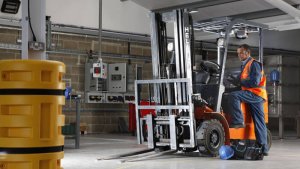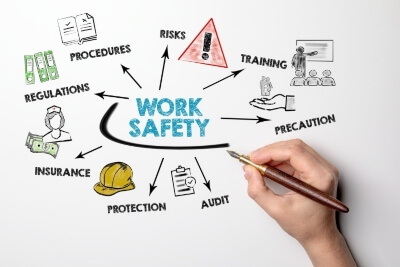You may look at the title of this blog and think to yourself “of course they are” and you’re right but if they are preventable then why do they continue to happen?
During the evolution of my career, I have spent many years operating lift trucks. I have seen many things done right, many things done wrong, as well as have witnessed a few lift truck accidents. I will say with 100% certainty that all of them could have been avoided. Most times, the accidents I witnessed were caused by human error.
Let’s look at the human element of operating a lift truck. Lift truck manufacturers design these machines to meet some of the highest safety standards, equipping features like seatbelts, seat pressure sensors, signal lights, horns, and backup beepers. The list goes on. With all this safety equipment available, there should be no reason for an accident; until the human element is applied.
As humans, we work around limitations that are placed on the equipment we use. A classic example of this is a lift truck that requires a seatbelt to be buckled together before operating. I have seen many operators buckle the seatbelt behind the seat’s backrest to get the forklift to function. I ask myself “why would anyone do this?”. As humans, we are always in a hurry and looking for the fastest way to get things done; time = money.
How many of you reading this that have operated a lift truck in the past have ever disabled a backup beeper? No need to admit it here but I am sure that some of you have. Yes, I know that backup beepers are annoying, but they are in place for a reason: to alert others.

While there can be many contributing factors involved with any lift truck accident, let’s focus on the following elements…
Untrained lift truck operators
Operating a lift truck when not trained on how to do so safely is never a good idea. There are many characteristics of a lift truck that the operator needs to understand. One of the significant characteristics to understand is the stability of the equipment. A lift truck is only designed to lift and move a maximum capacity of weight while counterbalancing it and staying upright. If you overload the lift truck, it becomes unstable and more likely to tip over.
Lift truck operators need to be competent and part of being competent is training. It is imperative that employers ensure appropriate training on workplace specific equipment transpires.
Indifferent attitudes
This contributing factor relates to the attitude of the operator. If the operator chooses to ignore the rules, an accident can happen. For example, although a lift truck may be rated to lift 4,500 lbs., it can likely pick up 6,000 lbs. or more; however, it can only counterbalance up to 4,500 lbs. This means that as you lift the load up, the rear end of the lift truck may start to come off the ground. Doing this essentially pushes the center of gravity beyond its stable point and can lead to a tip over.
If you have an operator like this in your workplace, you may need to get to the root of why the attitude exists. Sometimes, it may be related to the workplace; other times, it may just be their personality. Regardless, indifferent attitudes can pose a hazard to workers.
Horseplay
Most of you will likely agree to horseplay being a cause of accidents, and you’re right! Have any of you ever done this? An example of this could be shutting an operator’s propane tank off while moving, stunt driving and many others. Under the Occupational Health and Safety Act, horseplay that is strictly prohibited under section 28(2)(c). Any concerns about horseplay should be followed up and addressed by the supervisor.
Human Error
It’s well known that people make mistakes, which makes us human, but sometimes these mistakes may come with dire consequences. A mistake could be as simple as missing something on a pre-trip inspection or forgetting about the lift truck’s capacity when picking up a load. It’s important to know that mistakes, whether intentional or not, may be violations of the Occupational Health and Safety Act. While we do all make mistakes, the key is not to make one that could injure yourself or other workers.

Rushing
As I mentioned above, it is part of human nature to try and get things done as quickly and efficiently as possible but what must be compromised? Rather than taking shortcuts to get work done faster, we need to look deeper and find a balance between productivity and safety. Although rushing may get the job done faster most times, meaning an increase in productivity, one accident occurring because of rushing will slow production to a standstill and significantly affect a worker’s life along with a negative impact to the bottom line of the business.
Fatigue
Get an appropriate amount of sleep. I can’t stress the importance of this enough. Without a good night’s (or days) rest and a proper combination of diet and exercise, your body may become fatigued, impacting your motor functions significantly. Consequences of fatigue can include mental and physical performance. Studies cited from the CCOHS, report the effects of fatigue as:
- reduced decision-making ability or cognitive processing,
- reduced ability to do complex planning,
- reduced communication skills,
- reduced productivity or performance,
- reduced alertness, attention, and vigilance,
- reduced ability to handle stress on the job,
- reduced reaction time – both in speed and thought, as well as the ability to react,
- loss of memory or the ability to recall details,
- failure to respond to changes in surroundings or information provided,
- unable to stay awake (e.g., falling asleep while operating machinery or driving a vehicle),
- increased tendency for risk-taking,
- reduced physical capacity,
- reduced performance, such as a reduced ability to do task or job
- increased forgetfulness,
- increased errors in judgement,
- increased sick time, absenteeism, rate of turnover,
- increased medical costs, and
- increased incident rates.
Lack of attention
Pay attention to what you are doing and try to minimize distractions. A classic example of this is cell phones. Almost everyone owns a smartphone and spends a good chunk of their day being part of a virtual world. Have any of you seen those videos of people with their heads down and walking into a post, or a puddle, etc.?
Picture that, but on a lift truck; that has danger written all over it. Cell phones are not the only way to be distracted; it could be due to financial or relationship issues, talking to another person, or ideas floating around in your mind. Regardless of the distraction, know that distractions need to be avoided wherever possible.
Alcohol and/or drug abuse
I don’t think this one needs much of a description. If someone is impaired, they should not be operating a lift truck. If you are concerned about an operator being impaired, tell a supervisor about your concerns so they can be addressed.
As you can see, while there are many ways people contribute to lift truck-related accidents in the workplace, there is a way to prevent all of them. Most of these contributing factors are seen as common sense, but as we all know, there is no such thing. For the most part, common sense results from learned behaviour. This means that to avoid lift truck accidents, we need to educate operators on what can happen and its impact as a result.
Remember that although working safely may get old, so do those who practice it.
David Ardito
Industrial Safety Trainers Inc.





